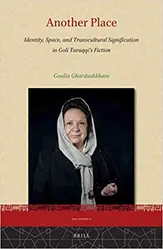
Dr. Goulia Ghardashkhani-Otter, Akademische R?tin
球探足球比分:
goulia.ghardashkhani(at)uni-bamberg.de
Telefon: +49 (0)951 - 863 2177
Sprechstunde: Mi., 12-14 Uhr und nach Vereinbarung per Mail.
Besuchsadresse: Schillerplatz 17, 96047 Bamberg, Raum SP17/02.12
Briefadresse: Otto-Friedrich-Universit?t Bamberg, Lehrstuhl für Iranistik, 96045 Bamberg
Wissenschaftlicher Werdegang
*1981 in Zanjan/Iran
seit 2022 Akademische R?tin am Lehrstuhl Iranistik in Bamberg
2020-2022 Projektmitarbeiterin am Lehrstuhl Iranistik in Bamberg (eigene Forschungsstelle, gef?rdert von der DFG 2019-2024)
2019-2020 Projektmitarbeiterin am CNMS, Fachgebiet Iranistik, Philipps-Universit?t Marburg
2010-2019 Lehrbeauftragte am CNMS, Fachgebiet Iranistik, Philipps-Universit?t Marburg
2015-2019 Bibliothekarin an der Universit?tsbibliothek Marburg, ‘Persica’
2015-2016 Wissenschaftliche Mitarbeiterin am CNMS, Fachgebiet Iranistik, Philipps-Universit?t Marburg
2015 Promotion im Fach Iranistik an der Philipps-Universit?t Marburg (magna cum laude)
2011-2015 Wissenschaftliche Hilfskraft am CNMS, Fachgebiet Iranistik, Philipps-Universit?t Marburg
2008-2010 Masterstudium der interkulturellen englischsprachigen Literatur an der Universit?t Bayreuth
1999-2008 Studium der englischen Literatur in Iran, Teheran

Publikationen
Monographien
Another Place: Identity, Space, and Transcultural Signification in Goli Taraqqi’s Fiction. Leiden: Brill, 2017.
Aufs?tze
“Da and Its Mothers of the Martyred: Meaning and Contest in an Iranian War Memoir.” British Journal of Middle Eastern Studies (online 2024), DOI: 10.1080/13530194.2024.2342175.
[mit] Olmo G?lz & Kevin L. Schwartz. “Introduction: Propagandas, Cultural Production, and Negotiating Ideology in Iran.” British Journal of Middle Eastern Studies (online 2024), DOI: 10.1080/13530194.2024.2342186.
“Narrative Geometry in ?Ali Reza Gholami’s Divar (The Wall): New Developments in Iranian War Literature.” Iranian Studies 53.5-6 (2020), 873-892. DOI: 10.1080/00210862.2020.1808449.
“Goli Taraghi”. The Literary Encyclopedia. Ver?ffentlicht am 30. August 2018 [https://www.litencyc.com/php/speople.php?rec=true&UID=13681]
“Iranische Emigrationsliteratur.” Handbuch der Iranistik II. Ed. Ludwig Paul. Wiesbaden: Reichert, 2017. 322-328.
“Farang Represented: Construction of Self Space in Goli Taraqqi’s Fiction.” Familiar and Foreign: Identity in Iranian Film and Literature. Eds. Mannani, Manijeh and Veronica Thompson. Athabasca: AU Press, 2015. 189-209.
Rezensionen
“Martyrdom Mysticism and Dissent: The Poetry of the 1979 Iranian Revolution and the Iran-Iraq War (1980-1988),” International Journal of Middle Eastern Studies 54.3 (2022), 614-616. DOI: 10.1017/S0020743822000629.
“The Literature of the Iranian Diaspora: Meaning and Identity since the Islamic Revolution,” Iranian Studies, 2020. DOI: 10.1080/00210862.2020.1728347
Vortr?ge
“Afghan Heritage Writing in Iran: Persian Literature or the Exotic Other,” 10th European Conference of Iranian Studies (ECIS), 21.-25. August 2023, Leiden.
“Gerneric Complication in Iranian War Literature,” Individuelle Lebenserfahrungen in Zeiten gro?er politischer Umbrüche: literarische Zug?nge zur iranischen Welt in der Gegenwart, Vies privées et grands bouleversements historiques dans le monde iranien contemporain: approches littérarires, 18.-20. Mai 2023, Bamberg.
“Warchitecture and Narrative Contention in Iranian War Fiction,” 34th Deutscher Orientalistentag (DOT), 12.-17. September 2022, Berlin.
“Renegotiating the Contemporary Iranian/Persian Literary Landscape: Afghan-Iranian Prose Literature,” 23rd Congress of International Comparative Literature Association (ICLA), 24.- 29. Juli 2022, Tiflis.
“Fighting the Wrong War: Narrative Misplacement in Zakariya Qa?emi’s Alabula [Hazy] (2020),” The Literary 1980s in the Middle East and North Africa: Towards A Transregional History of the Present, EUME, Forum Transregionale Studien, 29. Juni - 1. Juli 2022, Berlin.
“Da, a Double Dedication: Narrative Contest in a Woman’s War Memoir,” Pregnant Propaganda and the Birth of New Forms and Meanings: (Re)Production of State Ideology in Contemporary Iranian Art, Literature and Film, 29.-30. April 2022, Bamberg.
“Narrative Geometry and the Representation of War in ‘Ali Reza Gholami’s Divar (The Wall),” 9th European Conference of Iranian Studies (ECIS), 9.-13. September 2019, Berlin
“Once Upon a War: Subversive Narratives of the Iran-Iraq War, the Case of Majid Qeysari,” Modern and Contemporary Persian Literature: Genres and Representations, 28.-29. Juni 2018, Marburg
“The Grand Narrative of the “Holy Defense”: Dynamics of Representation and Subversion in Post-Revolutionary Iranian Literature,” 33. Deutscher Orientalistentag (DOT), 18.-22. September 2017, Jena
“Holy Defense and the Diachronic Representation of War Culture in Iranian Post-Revolutionary Prose Literature,” Interdisciplinary Workshop, 19. Mai 2017, Marburg
“The Imaginary Homeland: Iran as a Mosaic of Stereotypes,” 8th European Conference of Iranian Studies (ECIS), 15.-19. September 2015, St. Petersburg
“Leaving the Madhouse: The Function of Self-Narration in Autobiographical Stories,” Workshop on Iranian Contemporary Literature: Fiction, Drama, Literature, 29. Mai 2015, Marburg
“Identity, Narrative Articulation, and the Urge for Self-elimination in Goli Taraqqi’s Early Works,” 21st International DAVO Congress, 25.-27. September 2014, K?ln
“Identity, Space and Transcultural Signification in Iranian Emigration Literature,” Academic Workshop of Bamberg Graduate School of Near and Middle Eastern Studies (BaGOS), 25.-26. Oktober 2013, Bamberg
“The Function of the Funny: Cultural Translation and Irony in Firoozeh Dumas and Goli Taraqqi,” 32. Deutscher Orientalistentag (DOT), 23.-27. September 2013, Münster
“Identity, Space and Mobility in Goli Taraqqi’s Man ham Che Guevara hastam,” 1st Triennial Conference of the Scandinavian Society for Iranian Studies (SSIS), 30. M?rz 2012, Oslo
“From Homeland to Diaspora: The Process of Identity Formation in Goli Taraqqi’s Work,” 7th European Conference of Iranian Studies (ECIS), 7.-10. September 2011, Krakau
